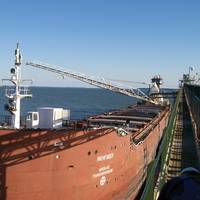Great Lakes Shipping Supports 237,000 Plus Jobs
The new study by the Department of Transportation Great Lakes - Saint Lawrence Seaway says that shipping supports more than 237,000 jobs and billions in economic activity.A year-long study of the economic impacts of the entire Great Lakes-St. Lawrence Seaway navigation system is a definitive and detailed report documenting the many contributions made by the Great Lakes Seaway system to federal, state/provincial and local economies.The study reports that in 2017 maritime commerce supported: 237,868 jobs, $35 billion in economic activity, $14.2 billion in personal income and local consumption expenditures and $6.6 billion in federal, state/provincial and local tax revenue.The study also highlights the specific economic benefits of key navigation infrastructure, such as the St.
Bi-national Study Highlights Green Advantages

A comprehensive report released today has defined the modal and environmental advantages of using marine shipping to transport goods in the Great Lakes-St. Lawrence Seaway region. A study titled The Environmental and Social Impacts of Marine Transport in the Great Lakes-St. Lawrence Seaway Region was conducted by Ontario transportation consultants Research and Traffic Group, and peer reviewed by independent experts in the U.S. and Canada. The study found that Great Lakes ships are more fuel-efficient and emit fewer greenhouse gases per thousand cargo-ton miles than land-based alternatives.
AGLPA Responds to BWT Research Findings

Steven A. Fisher, Executive Director of the American Great Lakes Ports Association takes issue with the findings of a Notre Dame Ballast Water Technology research paper. In recent years, a debate has raged between the maritime industry and environmental activists regarding the appropriate regulation of ships' ballast water. This public policy discussion has unfortunately been tainted by considerable misinformation. Such misinformation fuels "issue hysteria" and leads to poorly crafted regulations.





